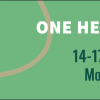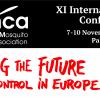
Education
As a professional organization of the European mosquito control operators, EMCA strives to educate its members and the public through training courses and its publications.
COURSES AND SCHOOLS
NO.1
Title: summer school
Published: 31/03/2023
Call for applications
Field Parasitology International Summer School
25 July - 3 August 2023, Danube Delta, Romania
Deadline for registration: 15 May 2023
Link for registration: here
Already a landmark event in veterinary parasitology, our summer school is designed for undergraduate students from veterinary medicine, biology and ecology. All activities take place in the field, in one of the most pristine wild environments from Europe, the Danube Delta.
The Field Parasitology International Summer School is organized since 2011 in Danube Delta by the University of Agricultural Sciences and Veterinary Medicine of Cluj-Napoca (Romania), Between 2011 and 2012, the location was in Sfântu Gheorghe, at the junction of Danube with the Black Sea. Since 2013, the event has taken place annually (usually in July) in the traditional and remote village, Chilia Veche, on the Chilia branch of Danube, at the border of Romania with Ukraine.
The main site of the summer school is on Ostrovul Tătaru, a large island separated from the main village by the Tătaru channel and reachable only by boats or by the mobile bridge, crossing the channel. The facilities consist of a field station, offering basic accommodation facilities (camping, kitchen, outdoor showers and latrines) and a lab equipped for field parasitology diagnostics. A recreational area (table tennis, pool billiard, swimming pool) together with dining place for the evening is offered by Pensiunea Vital, a locally run touristic facility.
For more details, please visit the website: http://zooparaz.net/fieldparasitology/index.html
NO.2
Transmitting science is offering a new 3-day course: Functional trait diversity: calculating and interpreting a key component of biodiversity.
Format: Live Online (synchronous). Places are limited to 18 participants.
Dates and schedule: May 3rd-5th, 2023, from 13:00-17:00 (Madrid time zone)
Instructor: Dr. Francesco de Bello (Desertification Research Center, Spain) and Dr. Carlos Pérez Carmona (University of Tartu, Estonia).
More information and registration:
https://www.transmittingscience.com/courses/ecology/functional-trait-diversity-calculating-and-interpreting-a-key-component-of-biodiversity/
or writing to courses@transmittingscience.com
“Course Overview
This course is focused on applying and interpreting indices of functional trait diversity, and related metrics of community trait structure, a key component of biodiversity that is becoming increasingly important to understand how communities might respond to environmental change and the consequences of these changes for ecosystem
functionality.
Functional diversity, the extent of trait differences between organisms, is a multifaceted concept that can be measured in many different ways, leaving ecologists often with technical doubts about which indices to use and how to apply them. We will deal with these doubts, with both real examples from biological communities and simulations and applying all concepts directly with several R scripts accompanying the instructor’s recent book on functional trait tools.
We will consider and learn how to compute and interpret different metrics of trait dissimilarity among organisms, learn how to account for intraspecific trait variability, combine indices of functional trait diversity with indices of phylogenetic diversity, compute functional diversity at different scales (e.g. alpha and beta partitioning of diversity) and learn how to navigate packages created by the instructor’s team (TPD, among others).”
EMCA TRAINING COURSES
In order to provide valid and updated field training for any acting or potential operator in the field, EMCA in collaboration with the European Society for Vector Ecology (E-SOVE) organized for the first time a 2-day Vector Control field Training Course in Thessaloniki (Greece) in October 2014.
In October 2016 the training course took place in Lisbon, Portugal aiming to give a full practical knowledge on surveillance, monitoring, identification and control of important vectors such as mosquitoes, blackflies, Culicoides, sandflies and ticks. 39 participants from 22 countries enjoyed having the privilege of being in the field with top experts on vector control and vector ecology and benefiting from their long term experience thus gaining all the basic and most up to date knowledge on these thematics.
In November 2022 the 3rd EMCA Training Course took place in Mendrisio, Switzerland, entitled "Identification of container-inhabiting Aedes mosquitoes’ egg". Registered attendance 26 persons from 15 countries. The activities organized by the University of Applied Sciences of Southern Switzerland (SUPSI) were: Egg counting and egg recognition by stereomicroscope, Egg recognition by high-resolution microscope, MALDI-TOF Mass Spectrometry, Molecular biology and questionnaires for egg recognition.
In November 2023 the 4th EMCA Training Couse will take place in Palma, Mallorca, Spain, with the selection of two titles «A- IDENTIFICATION OF NON TARGET FAUNA IN TRAPPING; B- MOSQUITO REARING AND REPElLENT TESTING”»
Latest News
23rd ESOVE Conference
20/01/2024XI INTERNATIONAL EMCA CONFERENCE & 4th EMCA TRAINING COURSE, PALMA, MALLORCA, SPAIN 3rd ANNOUNCEMENT
01/06/2023, Last update: 26/09/23RESULTS OF PRESIDENT ELECT ELECTIONS 2023
01/09/2023EMCA office
12 rue des Pucelles
67000 Strasbourg, France
EMCA office, c/o - Ecodevelopment SA
PO BOX 2420
57010 Filyro, Thessaloniki, Greece
(+30) 6970 975 001 office@emca-online.eu











